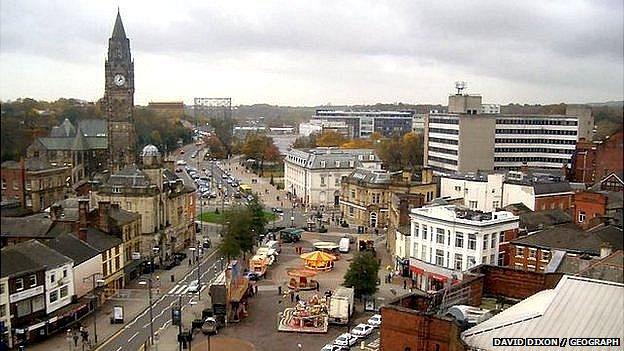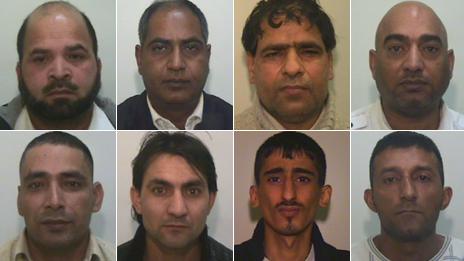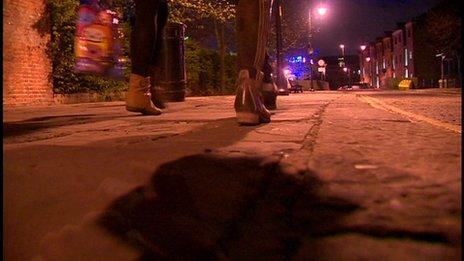Police 'sorry' over Rochdale child sex abuse failures
- Published

Nine men were jailed in 2012 for crimes including rape, trafficking and child sex abuse in Rochdale
Sex abuse of children in Rochdale needed more thorough investigation, rather than officers examining victims' credibility, police have admitted.
Greater Manchester Police apologised after a report highlighted failures "at individual and force level", external into its dealings with victims from 2008-2010.
Police chiefs were "distracted" by achieving targets on burglary and other crime, the review said.
However, no officers will face any misconduct proceedings, GMP said.
One former detective told the BBC there were probably hundreds of men involved in child sex exploitation (CSE) in the town and that it was a national problem.
Chief Constable Sir Peter Fahy said the force has "to do all we can to go after the offenders and work to protect victims as best we can".
Grooming network
The review, which examined police misconduct, was conducted by the police force with supervision from the Independent Police Complaints Commission.
It focused on the initial inquiry into sexual assaults on two girls - which came to police attention in 2008 - and wider decisions made by the leadership in the force's Rochdale division.
One victim's allegation of abuse was initially not prosecuted after the Crown Prosecution Service considered her to be unreliable, the review said.
It was only after the second girl made similar claims in December 2009 that detectives launched Operation Span to investigate allegations of child sex abuse.
GMP found more than 40 vulnerable girls across Rochdale and Heywood were subjected to grooming by a network of men, mostly takeaway workers and taxi drivers.
In 2012, nine men - eight of Pakistani and one of Afghan heritage - were jailed for crimes including rape, trafficking and child sex abuse, with sentences ranging from four to 10 years.
Assistant Chief Constable Dawn Copley admitted there had been a "complete lack of understanding" of child exploitation in Rochdale and a failure to recognise the "scale of abuse".
Although the review was conducted internally, it was being published because of "significant public interest", she added.
Seven officers were served misconduct notices but only one detective inspector, now retired, was described as having a "case to answer".
Therefore no action will be taken against any officers, who have all been offered further training, GMP said.
'Victims let down'
Rochdale MP Simon Danczuk said the report showed there was "a culture in GMP, which turned a blind eye to those sorts of crimes".
Former Det Con Margaret Oliver, who resigned from the force in 2013 over the treatment of such crimes, said there were "probably hundreds of men" involved in CSE.
"This isn't something that goes away. These men are now in very sophisticated gang networks and have been allowed to develop their skills in grooming and abusing young girls," she said.
"I could probably name 100 men that I am aware of and I'm one officer on one tiny sub-division in Greater Manchester.
"This is not just a problem with Greater Manchester - it's a national problem and the powers-that-be are more concerned with protecting their reputations than really getting to grips with it."
She said one of the main problems was the failure to record crimes "adequately", with them described as sexual activity with a child "when they should have been rape".
Ms Oliver also criticised Operation Span, which she said was "put together to put right what was wrong in 2008 and 2009" but continued to see those taken to court as a result of the operation "still not charged with rape, [but] mainly with trafficking offences".
'Systemic weaknesses'
Sir Peter said the Rochdale investigations "took the lid off this whole issue", but police "still haven't solved the key issue behind CSE, which is: how do you protect vulnerable young people who are determined to put themselves at risk and don't understand the degree to which they are making themselves vulnerable?".
"The court system struggles to deal with vulnerable victims of sexual offences where that very vulnerability - their background, the difficult upbringing that they have had - will be used against them to challenge their credibility.
"What we need is a comprehensive overhaul of the way the court system deals with these sort of cases. I'm not sure we need more reports because we know what the issues are."
He also said while some officers made "mistakes and errors of judgment" they were "operating in a much wider system which had some serious weaknesses."
'Unfair criticism'
"My concern is although we have made a lot of improvements a lot of those basic weaknesses in the system are still there."
Ms Copley acknowledged "victims were let down".
"We apologise to the victims and we give them our assurance that lessons have been learned, changes have been made and we are determined to use this to continue making improvements," she said.
Ian Hanson, chair of the Greater Manchester Police Federation, which represents rank and file officers, said: "I do feel that some degree of a reality check is needed in terms of the nature and magnitude of this problem, which goes well beyond the actions of individual police officers who find the missing from home cycle incredibly frustrating - yesterday in GMP our colleagues were called upon to search for four vulnerable children who had gone missing a total of 439 times previously between them."
He added: "It is very easy for politicians to criticise the police and find fault with the benefit of hindsight, however it does now always seem to be the case that it is police officers who bear the brunt of criticism.
"To simply blame individual police officers who were faced with complex and deep seated issues is grossly unfair."
- Published8 May 2012

- Published8 May 2012

- Published8 May 2012
